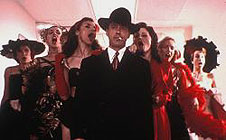|
|
|
|
The
Singing Detective
|
 |
|
Three types of scenes are presented in a flurry at the outset of The Singing Detective, a condensed, American big-screen version of Dennis Potter's famous television series. First there is a pastiche of film noir – wet, nocturnal streets, a femme fatale, smoky bars, voice-over narration, some convoluted murder-mystery plot. Then there is a stab at musical comedy, deliberately made to look amateurish and grotesque – with doctors and nurses pausing over a sick patient to swoon and croon to the beat of syrupy pop hits from the 1950s. Then there is the gruesome reality of that particular patient, Dan (Robert Downey Jr). Entirely covered in psoriasis and in too much pain to perform even the simplest physical task for himself, he is a raging mess of childhood neuroses and adult dysfunctions. Once you have seen this much of The Singing Detective, you need go no further. The film has nothing more up its sleeve. The mystery plot is never treated seriously, the singing and dancing get no better, and Dan keeps up his brittle, hate-filled monologue even as an egghead psychoanalyst, Dr Gibbon (Mel Gibson), tries to probe his mind. This is an indescribably awful, flaccid film, unbearable to watch. Director Keith Gordon does not lack talent, but too often his movies (including Mother Night [1996] and Waking the Dead [2000]) come over as pale versions of ideas and styles previously pioneered, and handled infinitely better, by such artists as David Lynch or David Cronenberg. In one sense, however, the second-hand nature of Gordon's work meshes well with this elephantine project left behind by the enormously overrated Potter – who, fifteen years previously, was a darling of Anglo high-culture. (Only Resnais' tribute to him in Same Old Song [1998] is defensible.) Even then, his work seemed to some like a banal, diminished re-run of the breakthroughs in modern narrative made by the great filmmakers of the '60s. Today, it looks utterly threadbare. Despite his public aversion to intellectual theory, Potter was a flagship for postmodernism in the arts – and also one of its first casualties. His laboriously constructed, split-level stories treat everything – from Hollywood genres to Freudian case-studies – as fodder for emptily vitriolic parody. There is so little belief in anything in Potter's stories that, when he tries to flip this game and finally deliver a profound, life-affirming moment of authenticity or redemption (as is attempted in The Singing Detective), the result is as phony and stupid as everything that preceded it. Downey is a very gifted actor, but his strident, one-note performance here strains even the affection of his fans. And, judging by the risible after-plot extra during the final credits where he steps 'out of character' and sings "In My Dreams" while pretending to be the real, transparent Robert, he has obviously decided to figuratively join Potter in that tomb of postmodernism. MORE Gordon: Wild Palms MORE Potter: Secret Friends © Adrian Martin July 2004 |
![]()